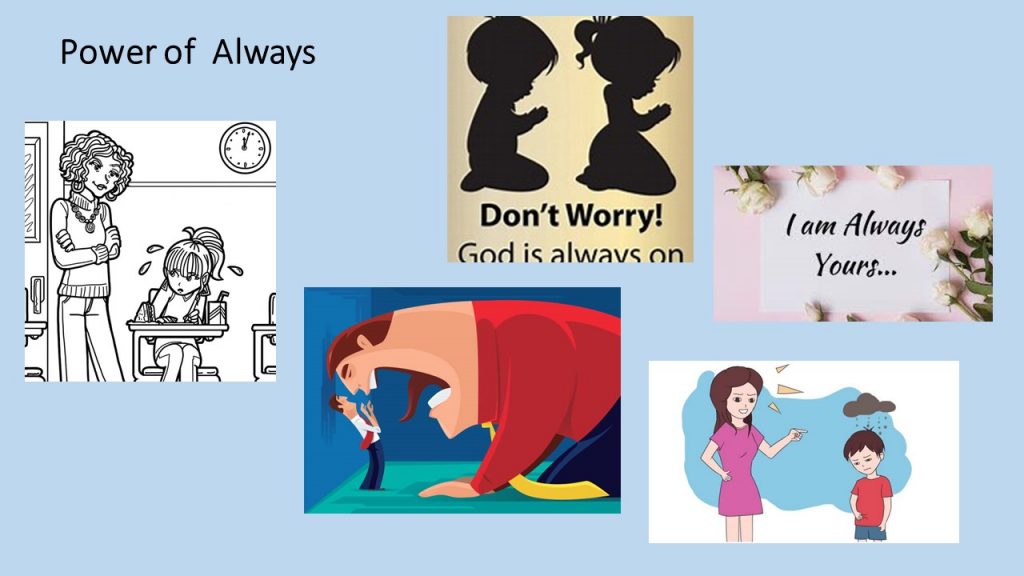
123. Do You Always Say Always? |你是不是老講 ”總是”
– Musings of Dr. Jamie C. Hsu, 9.8.2021
Do you use the word “always” and not think about the consequences? Be careful, this word can be a double-edged sword. On numerous occasions, I have seen how the use of “always” caused hurt, arguments, and hard feelings. Or, conversely, it provided encouragement and conveyed love.
Too often we see the following scenarios: parents say to their children, you are always so messy; teacher to pupil, you are always late with your homework; boss to subordinates, you always miss the sales targets. The examples are numerous. But the reactions from the receiver are similar: “What do you mean I always?” “I just did it this time,” “You are just picking on me,” or “You just like to exaggerate.” The defense mechanism makes the accused become the accuser. Thus, an innocent comment might trigger a big argument or even hide hard feelings for a long period of time.
Instead of complaining with the word “always,” try a different approach and say “Please don’t leave the clothes on the floor,” “Don’t be late with your assignments,” “Anything you and I can do to increase the sales volume?” This kind of communication will focus on the issues and not turn it into personal accusations and attacks.
Conversely, the use of “always” in a positive way can be a powerful motivator. I still remember when I was in first grade and my mother told our neighbors that I “always” finish my homework before going out to play. It might not be totally true, but those encouraging words prompted me to try hard to live up to her expectation of “always” doing my homework first.
I hope you will observe and listen to your family, schoolmates, friends, and colleagues to see how the word “always” is being used and the reactions it causes. I think you will begin to appreciate its power and handle it with more care. Practice makes perfect. I hope you will “always” use the word “always” effectively. ☺

你是不是老講 ”總是”
-作者 許俊宸博士
-中譯 薛乃綺
你是否經常用”總是”這個字眼,卻沒有想到有什麼後遺症?當心這個字可能是把雙面刃。我在許多場合當中看到,用”總是”這個字,可能造成傷害、爭執、難過;又或者帶來了鼓勵、傳達了愛。
我們常常看到這樣的對話。父母對孩子們說:你總是搞得亂七八糟的。老師對學生說:你總是作業遲交。老闆對下屬說:你總是沒達到營業目標。類似的例子不勝枚舉。但是,聽到這些話後的反應也很類似。”你的意思是我總是這樣嗎?”、”我只不過這次這樣罷了”、”你就是在找我麻煩”、”你就愛誇大其辭”。被啟動的防禦機制讓被告變成了控訴者。就這樣,一句單純的評論,可能演變成一場大爭吵,甚至是長時間的冷戰。
與其抱怨”總是”這個詞,不如嘗試不同的方法,比如說:”請不要把衣服丟在地上”、”不要遲交作業”、”你跟我可以一起做哪些事情來增加營業額?”等,這類的溝通可以讓我們專注在問題上面,而不是轉移成針對個人的指責與攻擊。
相反地,以積極的方法使用”總是”,可能是一個強大的動力。我還記得我上一年級的時候,我媽媽告訴我們的鄰居,我總是做完作業才出去玩。這樣說不見得全都如此,但這種鼓勵人心的話,讓我很努力不辜負她對我總是會先把功課做完的期望。
我衷心希望你能觀察、聽聽你的家人、同學、朋友、和同事的意見,看看”總是”這個字眼是怎麼被使用的、以及它所引起的反應。我想你會開始欣賞它的力量,並更加小心地處理它。所謂”熟能生巧”,希望你總是正確地使用”總是”這個字。J


